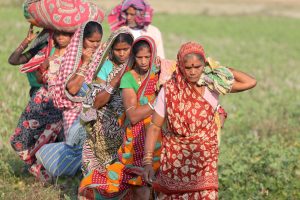Context of Module 5: Women, Girls and Gender Equality
 Women and girls have always suffered from patriarchal interpretations of almost all religions. This is not limited to any particular religion or region. The resulting male domination is a negative inheritance in virtually all cultures, even though some progress has been made in the past decades. Women’s right to vote, for example, was not recognized across the world until quite recently, including in Western countries. Equal pay for the same work by women and men is still far from a reality in almost all parts of the world. Religious interpretations have been invoked as grounds for inequality, including through States’ reservations to human rights treaties. Unsurprisingly, many women’s rights activists have developed negative attitudes towards religion. This polarization has created a vicious circle, threatening equality and solidarity at the nucleus level of the family. Most family-related issues have a faith dimension in many parts of the world, including marriage, divorce, custody and inheritance. The confusion between cultural heritage, social traditions and religious precepts adds to the complexity of handling this important intersection between religions and human rights. In addition, the ideological divide between faith groups and human rights activists on sexual and reproductive health matters adds tensions between faith and rights. Constructive engagement to search for common ground in this context should continue. Faith actors have a role to play and women’s and girls’ rights have much to gain in this regard.
Women and girls have always suffered from patriarchal interpretations of almost all religions. This is not limited to any particular religion or region. The resulting male domination is a negative inheritance in virtually all cultures, even though some progress has been made in the past decades. Women’s right to vote, for example, was not recognized across the world until quite recently, including in Western countries. Equal pay for the same work by women and men is still far from a reality in almost all parts of the world. Religious interpretations have been invoked as grounds for inequality, including through States’ reservations to human rights treaties. Unsurprisingly, many women’s rights activists have developed negative attitudes towards religion. This polarization has created a vicious circle, threatening equality and solidarity at the nucleus level of the family. Most family-related issues have a faith dimension in many parts of the world, including marriage, divorce, custody and inheritance. The confusion between cultural heritage, social traditions and religious precepts adds to the complexity of handling this important intersection between religions and human rights. In addition, the ideological divide between faith groups and human rights activists on sexual and reproductive health matters adds tensions between faith and rights. Constructive engagement to search for common ground in this context should continue. Faith actors have a role to play and women’s and girls’ rights have much to gain in this regard.